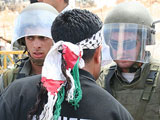Jerusalem Clashes Symptomatic
By Dominic Moran for ISN
For Israel, the apparent leak of the intended visit of Jewish-Israeli extremists to the Temple Mount/Al-Haram ash-Sharif came at a time when Prime Minister Binyamin Netanyahu's government was attempting to draw the sting from the Goldstone report on the December-January Gaza conflict.
A primary Israeli concern is that the report could be utilized by Arab and European states in presenting the case for significant changes in Washington's current approach toward the resumption of the Palestinian-Israeli peace process.
The White House appears to be running out of options, after ill-advised efforts to goad unwilling Arab states into concessions to Israel, without any sign that Israel would agree to more than a symbolic settlement freeze.
The report's wider discussion could also make it more difficult for Israel to manage already fraught relations with some EU states, Egypt and Turkey.
In seeking to neutralize the report, Israel has successfully fostered the concerns of major powers over the potential impact of the Goldstone report, which decries both alleged Israeli and militant war crimes, on their own military engagements.
This Israeli coup was compounded by the bizarre decision of PA President Mahmoud Abbas and his close advisors not to immediately demand that the report be sent to the UN for discussion, despite its likely veto.
The popular opprobrium in the Palestinian territories over this decision has again allowed Hamas to paint Fatah as an Israeli and US lackey. It has undermined all the good work done by the movement in its successful Bethlehem congress, underlining that the real power in the PA continues to reside with a unilateralist presidency.
If, as some Israeli officials claim, the PA was responsible for orchestrating the Jerusalem clashes, in a bid to deflect popular anger, this effort has failed.
The winners here are Hamas and the northern wing of Israel's Muslim Brotherhood.
For the latter, the Israeli response is seen as validation of their primary mantra: that the Muslim holy places in Jerusalem's Old City are under threat.
The arrest of the group's leader, Sheikh Raed Saleh, and his deputy for alleged incitement at the height of the clashes, appeared calculated by Israel to draw support away from other Arab-Israeli political movements and to foster the impression that the movement constitutes a security threat - for which there is no real evidence.
Other key Arab-Israeli political players, Hadash, Balad and the southern wing of the Israeli Brotherhood were forced to scramble to protect their political bases, with the nationalist Balad engaging in rare, scathing criticism of the PA over Ramallah's response to the Goldstone report.
For Hamas, the PA decision not to promote debate on the report was manna from heaven at a time when it was effectively being railroaded by Egypt into a national reconciliation agreement with Fatah.
The details of the proposed unity pact show the straits in which the group has found itself in Gaza. It involves the ostensible handing of security and political control over Gaza to multi-factional control in return for fresh PA presidential and parliamentary elections.
Hamas leaders had increased their rhetoric against Abbas and the PA leadership in a bid to paint themselves out of the corner through an exaggerated international response.
Incredibly, Washington appears to have obliged, external pagereportedly forcing the Egyptians to shelve the dealcall_made.
Given that Hamas has previously signaled its willingness to allow the Fatah-controlled PLO to handle peace negotiations with Israel under a unity administration, and that any peace pact without Hamas' tacit acceptance is worthless, Washington's apparent scuppering of the deal is astonishing.

